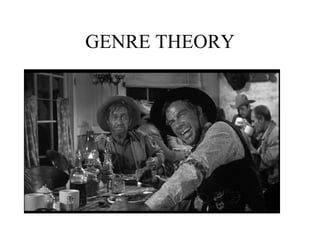
Genre theory
- 1. GENRE THEORY
- 2. Genre Theory Daniel Chandler: Conventional definitions of genres tend to be based on the notion that they constitute particular conventions of content (such as themes or settings) and/or form (including structure and style) which are shared by the texts which are regarded as belonging to them.
- 3. It is easy to underplay the differences within a genre. Steve Neale declares that 'genres are instances of repetition and difference' (Neale 1980, 48). He adds that 'difference is absolutely essential to the economy of genre': mere repetition would not attract an audience. Texts often exhibit the conventions of more than one genre. John Hartley notes that 'the same text can belong to different genres in different countries or times' (O'Sullivan et al. 1994).
- 4. Traditionally, genres (particularly literary genres) tended to be regarded as fixed forms, but contemporary theory emphasizes that both their forms and functions are dynamic. David Buckingham argues that 'genre is not... simply "given" by the culture: rather, it is in a constant process of negotiation and change' (Buckingham 1993).
- 5. Daniel Chandler: Every genre positions those who participate in a text of that kind: as interviewer or interviewee, as listener or storyteller, as a reader or a writer, as a person interested in political matters, as someone to be instructed or as someone who instructs; each of these positionings implies different possibilities for response and for action. Each written text provides a 'reading position' for readers, a position constructed by the writer for the 'ideal reader' of the text. (Kress 1988,) Thus, embedded within texts are assumptions about the 'ideal reader', including their attitudes towards the subject matter and often their class, age, gender and ethnicity.
- 8. Tom Ryall (1978) – Genre provides a framework of structuring rules, in the shape of patterns/forms/styles/structures, which act as a form of ‘supervision’ over the work of production of filmmakers and the work of reading by the audience. John Fiske defines genres as ‘attempts to structure some order into the wide range of texts and meanings that circulate in our culture for the convenience of both producers and audiences.’ Steve Neale (1990) argues that Hollywood’s generic regime performs two inter-related functions: i) to guarantee meanings and pleasures for audiences ii) to offset the considerable economic risks of industrial film production by providing cognitive collateral against innovation and difference .
- 9. Neale (1980) - much of the pleasure of popular cinema lies in the process of “difference in repetition” – i.e. recognition of familiar elements and in the way those elements might be orchestrated in an unfamiliar fashion or in the way that unfamiliar elements might be introduced Rick Altman argues that genres are usually defined in terms of media language (SEMANTIC elements) and codes (in the Western, for example: guns, horses, landscape, characters or even stars, like John Wayne or Clint Eastwood) or certain ideologies and narratives (SYNTACTIC elements).
- 10. Can Genre be defined by audience? Is it a question of film comprehension? Neale (1990) – Genre is constituted by “specific systems of expectations and hypothesis which spectators bring with them to the cinema and which interact with the films themselves during the course of the viewing process.”
- 11. Jonathan Culler (1978) – generic conventions exist to establish a contract between creator and reader so as to make certain expectations operative, allowing compliance and deviation from the accepted modes of intelligibility. Acts of communication are rendered intelligible only within the context of a shared conventional framework of expression. Ryall (1998) sees this framework provided by the generic system; therefore, genre becomes a cognitive repository of images, sounds, stories, characters, and expectations
- 14. David Bordwell notes, 'any theme may appear in any genre' (Bordwell 1989) ‘One could... argue that no set of necessary and sufficient conditions can mark off genres from other sorts of groupings in ways that all experts or ordinary film-goers would find acceptable'
- 15. PROBLEMS WITH GENRE CLASSIFICATION Theorist and Critic Rick Altman (1999) came up with a list of points he found problematic with genre classicfication . a) Genre is a useful category, because it bridges multiple concerns. b) Genres are defined by the film industry and recognised by the mass audience. c) Genres have clear, stable identities and borders.
- 16. d) Individual films belong wholly and permanently to a single genre. e) Genres are transhistorical. f) Genres undergo predictable development. g) Genres are located in particular topic, structure and corpus. h) Genre films share certain fundamental characteristic. i) Genres have either a ritual or ideological function. j) Genre critics are distanced from the practice of genre.